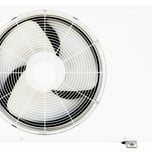Answer these simple questions and we will find you the BEST prices
Which type of solar quotes do you need?
It only takes 30 seconds
100% free with no obligation

Get up to 3 quotes by filling in only 1 quick form

Slash your energy bills by installing an energy efficient boiler

We’ve helped over 500,000 homeowners reduce their carbon footprint
- GreenMatch
- Heating
- Central Heating Installation Costs
Central Heating Installation Cost: Complete Guide 2025

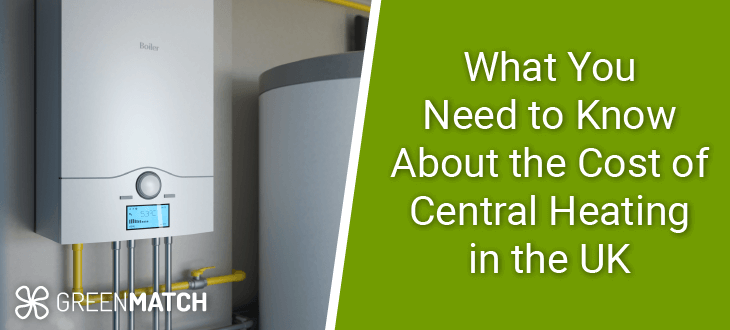
- The average cost of installing central heating is around £5,400 for a full job, but this can fluctuate depending on the chosen heating system and the complexity of the installation.
- For central heating powered with a combi boiler, it costs around £3,800 for the boiler and an additional £180 - £250 per flat panel radiator.
- A good boiler can last for 5 - 10 years, slashing your long-term energy costs by up to 30%.
Calculating your full central heating installation cost includes the price of a boiler, radiators, heating controls, and pipework. Each element of this system requires careful consideration before installation to ensure that your new central heating system optimises while limiting potential mounting costs.
In this guide, we walk you through the various aspects involved in upgrading your home heating. Keep reading to find out the costs of a new central heating system in the UK today.
Ready to heat your home but want to avoid a hefty boiler cost? Save yourself countless hours of research and vetting through our quote-price services.
Fill out our form in just 30 seconds, and you can contact up to 3 local installers for no-obligation quotes on appliances and installation services. Our service is simple and completely free. Click below to get started today!
- Quotes from local engineers
- Payment by finance available
- Save up to £975
It only takes 30 seconds



- Central heating installation cost: Average price
- Factors that influence central heating installation costs
- Central heating installation: Finding the right boiler
- Central heating running & maintenance costs
- How to cut down on the costs of a new central heating installation
- Central heating installation: step-by-step guide
- Finding the right central heating installer near you
- FAQ
Central heating installation cost: Average price
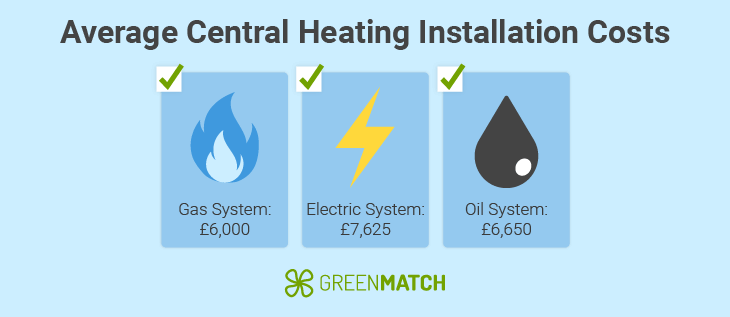
In general, the cost of installing central heating in the UK sits between £3,100 - £7,700, with the average cost being around £5,400. Here's a closer look at average prices based on the type of heating system you opt for:
| Type of central heating | Price range | Average cost |
|---|---|---|
| Gas system | £4,200 - £7,800 | £6,000 |
| Electric system | £5,450 - £9,800 | £7,625 |
| Oil system | £4,300 - £9,000 | £6,650 |
Keep in mind that the cost of a central heating system depends on several factors, such as the boiler, radiators, heating controls, and pipework. In addition, some key factors will influence your final costs, including the system you opt for, the size, manufacturer, and other specific home conditions.
The location and complexity of the installation process can also significantly influence labour charges. It's always a good idea to get a professional home assessment beforehand to receive accurate quotes tailored to your needs.
Every home is different, and costs will always vary. Some homes may need more radiators than others, while others may opt for extra components such as smart thermostats to better monitor their energy usage.
Central heating installation cost for a 3 bedroom house
A 3-bedroom home is the most common type of residence in the UK. Installing gas central heating in a 3-bedroom house in the UK costs between £5,140 - £11,600, with an average sitting at £8,370.
This final price range is calculated to include a new gas combi boiler, up to 10 radiators, necessary pipework, heat controls, and the average labour costs of 5 days, depending on the extent of the work. If there is existing pipework and radiators in your property, then your final cost will be significantly cheaper.
Below, you can see the cost of installing various components of a gas central heating system:
| Expense category | Average costs |
|---|---|
| Boiler upgrade | £3,800 |
| New radiators (3 units) | £773 |
| Additional pipework | £900 |
| Smart thermostat (Optional) | £215 |
| Installation labour (per day) | £400 |
| Installation | £1,500 |
Combi boiler and radiator installation costs
Combi boiler and radiator installation costs vary depending on several factors but typically range from £2,520 - £9,200 in the UK, with an average cost of £5,860. This is calculated based on the needs of a medium-sized UK home, containing an average medium-sized combi boiler (28 - 34kW output) and at least 8 column radiators as well as installation costs. Your final investment will likely fluctuate depending on your home size and personal property needs.
Here’s a full breakdown of the key factors that can affect your final costs:
- Property size: Installations for larger houses with more radiators generally cost more. A small 1 - 2 bedroom property will need a 24 - 27kW combi, a medium 2 - 3 bedroom property will need a 28 - 32kW combi, while a 4+ bedroom house will require a 35 - 42kW model.
- Number of radiators: Adding new radiators increases installation complexity and price. An average 3-4 bedroom house has around 8 - 10 radiators, while a larger home may have 20 radiators or more.
- Boiler type & efficiency: High-efficiency combi boilers may cost more upfront but can save you up to £490 in the long run.
- Fuel type: Gas boilers are most common, but oil or LPG options have different installation costs. Natural gas is the most common and affordable fuel for boilers.
- Additional components: Smart thermostats, filters, or system upgrades can add £500 - £1,500 to the final price.
Central heating installation cost for a 4 bedroom house
Installing central heating in a typical UK 4-bedroom house can cost anywhere between £6,325 - £16,800, with an average cost of £11,563. These costs are based on a total central heating installation and take into account several components such as a new gas combi boiler, up to 20 radiators, necessary pipework, heat controls, and labour costs. Your final price will be significantly cheaper if there is existing pipework and radiators in place.
4 bedroom homes in the UK are typically found in the form of detached houses. Therefore, a core factor in the effectiveness of central heating will also rely on effective insulation measures, such as wall, loft, and floor insulation.
It’s highly recommended to conduct a thorough house assessment with an accredited installer so that the best course of action can be tailored to your home needs. However, finding the right installer can require countless hours of research and vetting.
With GreenMatch, you don't have to spend hours searching for local installers. Get started in just 30 seconds and find up to 3 central heating quotes for your situation for free and with no hassle – simply click the button below to begin.
- Quotes from local engineers
- Payment by finance available
- Save up to £975
It only takes 30 seconds



Factors that influence central heating installation costs
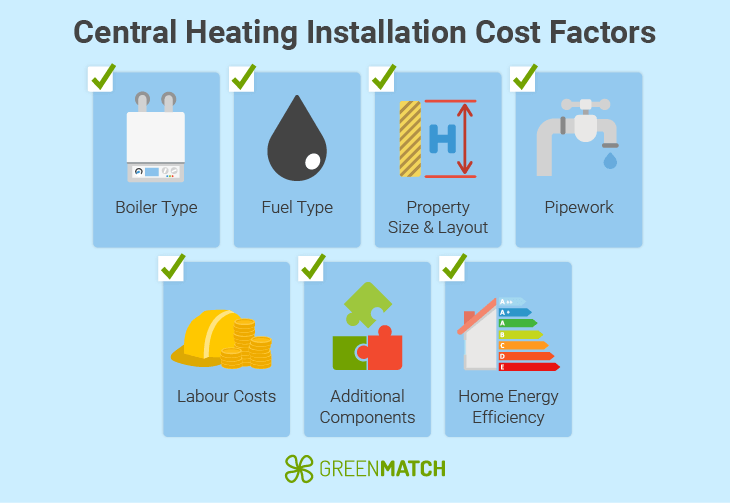
Several factors can affect the overall costs of a central heating installation. From boiler types to installation complexities, here’s a breakdown of some key elements to look out for:
- Boiler type: Changing boiler types is usually costly and requires additional installation steps, such as swapping out a hot water tank or other components. For example, switching from a conventional boiler to a combi model is one of the more expensive replacements that can cost around £2,125 - £6,425 (incl. installation).
- Fuel type: The most popular fuel for heating in the UK is gas due to national grid connections, however, some homes may use electric, oil, or LPG instead. This can raise prices, as the latter fuel types tend to cost more per unit than gas.
- Property size and layout: As a rule of thumb, larger homes will require more radiators, thus raising your initial material investment and installation costs. For example, central heating for a 2-bedroom is around £4,500, whereas a 3-bedroom is upwards of £6,000.
- Pipework: If your house lacks the appropriate pipework for your new boiler or is outdated and damaged, labour costs may increase to accommodate installation complexity and duration. Pipework replacement can cost an extra £800 - £1,000.
- Labour costs: On average, labour costs in the UK are around £300 - £500 per day, but this value can fluctuate depending on your location and the complexity of the job. For example, urban centres may have more favourable costs than rural countryside. Additionally, a like-for-like boiler swap can take 4 - 6 hours, whilst a system change can take 1 - 5 days, drastically increasing labour costs.
- Additional components: Certain recommended components can help a homeowner keep a better check on their energy use, which can cost an additional amount. For example, a smart thermostat system can cost an extra £150 - £280.
- Home energy efficiency: Homes that lack proper insulation measures can experience higher energy bill costs due to constant heat loss. The inability to retain heat results in an overworked central heating system. For example, uninsulated walls alone can lead to a staggering 33% of home heat loss.
Central heating installation: Finding the right boiler
Before a Gas Safe engineer steps into your house, there are several measures you could take to ensure you get the best fit for your house. Conducting a house assessment can help determine which type of boiler is worth installing to meet your needs, which fuel type suits your budget and heating project, as well as other additional considerations like your heating usage patterns or specific requirements.
Here’s a breakdown of the steps you should take to land the best central heating system for your property needs...
Type of boiler replacement
Central heating replacement costs will be directly impacted by the kind of boiler replacement you need. For instance, a like-for-like boiler swap in the same position in your home will be easier than changing the position of the boiler or changing the type of boiler.
A like-for-like swap means that the surrounding pipework can easily connect to the new boiler, which can usually be done in about a day or two. On the other hand, switching to a new type of boiler could take a few days, since different boiler types require different components which will need to be installed or taken away.
| Type of boiler replacement | Price range | Average cost |
|---|---|---|
| Like for like combi boiler swap | £1,600 - £6,000 | £3,800 |
| System to combi boiler | £1,550 - £5,650 | £3,550 |
| Regular to combi boiler | £2,125 - £6,425 | £3,800 |
If we assume a home is installing a new combi boiler, the UK’s most popular boiler type, then the boiler replacement costs will depend on the old boiler type.
It’s important to note that like-for-like combi boiler swaps are almost always cheaper than system changes, despite the higher average prices you may see here. The higher averages you may notice are because our boiler cost ranges include gas, LPG, and oil boilers, with oil being the most expensive, thus driving up the average cost.
Type of boiler: combi, system, conventional
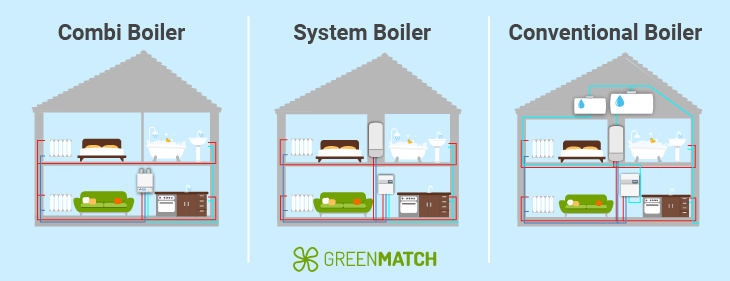
Central heating system price varies depending on the type of boiler you choose for your household. Your boiler choice will hinge on several factors relating to your home needs. For example, combi boilers may exhibit remarkable efficiency, but they’re not as effective at delivering hot water to multi-bathroom homes as regular or system boilers are.
Here’s a breakdown of the three most common boiler types, as well as details on average prices, fuels, and home suitability:
| Boiler type | Average price (incl. installation) | Fuel types | Home suitability |
|---|---|---|---|
| Combi boiler | £3,800 | Gas, oil, LPG, electricity | Smaller homes with a single bathroom. |
| System boiler | £3,300 | Gas, oil, LPG | Larger homes with several bathrooms. |
| Conventional boiler | £3,550 | Gas, oil, LPG | Larger homes with several bathrooms. |
The three most common boiler types each come with varying price ranges, pros and cons, and specific characteristics that make them suited for different property sizes and needs:
- Combi boilers, or combination boilers, are the most popular with UK homeowners. They are energy-efficient, providing both heating and hot water on demand without the need for a separate storage tank. New combi boiler prices range from £600 - £4,000. Combi boilers can be fuelled by gas, oil, LPG or electricity.
- System boilers are another favourite, known for their simplicity and ease of installation. They work with a separate hot water cylinder and suit larger households with higher hot water demands. System boilers cost somewhere between £600 - £3,000.
- Conventional boilers come with a hot water cylinder and a cold water storage tank. They are usually only recommended as a replacement for homes with an existing conventional set-up, as their extra parts and labour requirements can make them very expensive to install. In most cases, a system boiler would be the best choice for providing for high hot water demand. Conventional boilers, also known as regular boilers, cost somewhere between £600 - £3,500.
All of these boilers can work with different fuels, which may further affect your costs. For instance, electric central heating installation costs will differ from oil or biomass systems.
Moreover, it’s crucial to factor in how much replacing central heating pipes will cost and potentially invest in other crucial components, like radiators and thermostats.
For the most tailored prices, you should consult a heating engineer who can assist you in finding the right options for your home. However, researching and vetting installers can require hours of surfing websites and scheduling phone calls. To save time and money, let GreenMatch UK handle the work for you!
All you need to do is fill in our 30-second form and you’ll receive up to 3 quotes from pre-vetted local heating engineers. Our service is completely free, and there is no pressure to accept any quotes. Click below to get started today!
- Quotes from local engineers
- Payment by finance available
- Save up to £975
It only takes 30 seconds



Type of fuel: gas, oil, electricity, LPG, biomass

Boiler systems for central heating are adapted to work with a range of common fuel types. Here’s a breakdown of each kind of fuel, including the unique benefits and drawbacks they may come with:
- Natural gas: The most common fuel in the UK, natural gas is delivered through the national grid to connected homes, and the running costs largely depend on current gas prices. While gas is convenient and widely used, its combustion inevitably releases CO2 into the atmosphere, contributing to greenhouse gas emissions.
- LPG: Not all properties have access to the national gas network, thus alternative fuels such as oil and LPG heating (liquefied petroleum gas) are suitable for such off-grid homes as the fuel can be stored on-site. While effective for heating, these energy sources are also fossil fuels that emit greenhouse gases when burned.
- Biomass: Biomass boilers burn organic materials (such as wood chips or pellets), which offer a more environmentally friendly and sustainable option due to a lack of reliance on fossil fuels.
- Electric: For smaller homes, electric boilers provide a straightforward choice, operating without burning fuel and utilising electricity for heating and hot water production. Electric boilers are very efficient since they don’t directly burn fuel to produce heat. If paired with the green electricity grid, these systems can also be better for the environment, especially when combined with a domestic solar PV system.
| Fuel type | Boiler price | Running cost (per year) |
|---|---|---|
| Gas | £600 - £3,300 | £91 |
| Oil | £1,300 - £4,000 | £500–£600 |
| LPG | £600 - £3,200 | £500–£600 |
| Electric | £500 - £3,000 | £500–£1,500 |
| Biomass | £6,000 - £12,000 | £500–£1,500 |
Central heating running & maintenance costs
Simply put, the more hot water and heating you need, the higher the central heating running costs will be. Assuming an annual energy consumption of 11,500kWh and accounting for gas prices, the average cost of running central heating with a combi boiler is around £840 annually, not accounting for daily standing charges. Since combi boilers fueled by gas from the national grid are the most popular form of central heating in the UK, this is the average running cost most homes can expect.
Several factors play a role in determining running costs. Here are some of the most impactful:
- Fuel type: Gas from the national grid tends to be the cheapest type of fuel. According to Ofgem data from 2023, gas costs £0.6 per kW, while electricity costs £0.7 per kW.
- Annual energy consumption: Ofgem estimates that an average British household has about 2.4 residents and uses about 11,500kWh of gas or 2,700kWh of electricity.
- Boiler efficiency: New gas combi boilers boast some of the highest energy efficiencies, between 92 - 94%. This means for every £1 spent on energy, only 6 to 8 pence is lost! This is much lower than old boilers with poor efficiency of less than 70%, which can cost you up to 30 pence per pound.
In terms of maintenance and servicing costs, the cost range for central heating sits at around £65 - £300, but these costs can fluctuate depending on the needs and complexity of the job. Other factors such as labour rates and additional repairs also play a role in defining this price.
How to cut down on the costs of a new central heating installation
To prevent the costs of all these central heating features from building up, it’s important to remain strategic throughout the process of choosing your new central heating system.
For a smoother installation process that is budget-friendly, follow these strategic tips:
- Preparation: Clear the installation space of furniture to speed up the process and avoid extra labour charges.
- Boiler type: Consider like-for-like boiler and radiator swaps to reduce installation time and overall costs.
- Installation timing: Schedule your boiler replacement in summer when demand is lower. Make sure to also plan to avoid last-minute expenses and explore potential deals.
- Get multiple quotes: Request and compare quotes from various certified heating engineers to find the best deals on components and services, ensuring cost-effectiveness when it comes to your new central heating system.
Central heating installation: step-by-step guide
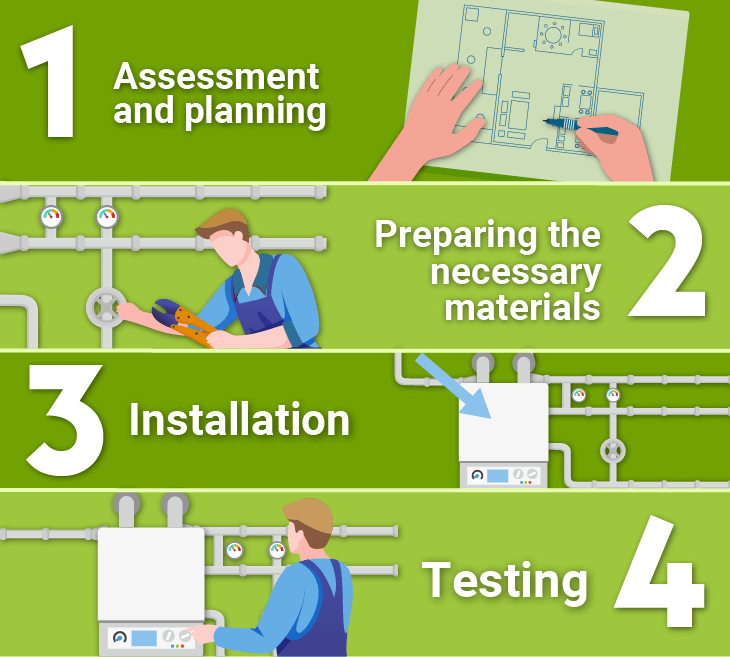
Installing central heating is a complicated process and requires professional expertise. Generally, it's done in the following steps:
- Assessment and planning: Count the number of rooms, think of insulation and plan the layout of the radiators, your boiler, and pipework.
- Preparing the necessary materials: With the help of a professional engineer, choose the optimal boiler, radiators, pipework, and the required fittings.
- Installation: Locate the radiators and make sure they are securely mounted. Next, connect the radiators to the boiler through pipework. Check the insulation and sealing.
- Testing: Check the system for any leaks after filling it with water. Next, bleed the radiators to remove the air. Finally, test your central heating system to check if it works properly.
The process of installing central heating must be carried out by an accredited professional. Gas Safe / OFTEC-certified professional installers ensure that the installation follows safety regulations, is of high workmanship, and is tailored to the best needs of your property.
Finding the right central heating installer near you
Since a central heating engineer’s work will have long-term impacts on the safety and comfort of your home, you deserve the assurance that you are provided a high-quality service. That is why you will want to choose the right central heating system installer before starting your home improvement project.
But how can you decide which installer is the best one for the job in your home? You will want to make sure that they are highly regarded by other customers and that they have all the necessary qualifications, such as being Gas Safe registered for boiler installations.
You could spend hours reading reviews and comparing installation services and costs and still find no bargain in sight. Fortunately, GreenMatch UK can help you easily reach out to highly qualified installers from our network of specialists in just 30 seconds!
With our free, no-obligation service, you can be connected with up to 3 local heating engineers who can offer tailored quotes based on your home’s energy requirements. You can then compare their rates to make the most of their competitive prices and find the best deal for your home. Simply click below to begin!
- Quotes from local engineers
- Payment by finance available
- Save up to £975
It only takes 30 seconds



FAQ
The estimated cost of installing a new central heating system is around £3,100–£7,700. However, several factors will affect your home’s total cost of a new heating system, depending on your situation.
Currently, central heating systems fueled by gas are the cheapest option in the UK. Nevertheless, this might not be a feasible option for your home if you are not connected to the national gas grid. You should check what other options are available to find the best heating system for your situation.
Replacing a radiator with the same radiator type can cost around £160–£470. However, different factors such as the size of the installation you need, will determine the total cost of your radiator replacement.
The cost of replacing central heating pipes in the UK varies depending on the property size, the heating system type, and the installation complexity. Usually, the cost of pipework installation for a new central heating system, including both the supply of pipes and the labour, is anywhere between £500 and £1,000.

Akif is a copywriter at GreenMatch since 2023. With a keen interest in community sustainability, green solutions and the role of digital media in identifying climate trends, he aims to hone in on his background in International Studies and Digital Media to provide a multidisciplinary approach to written content rooted in credible research and accuracy.
We strive to connect our customers with the right product and supplier. Would you like to be part of GreenMatch?

- How Much Does it Cost to Install Central Heating in the UK
- Central heating installation cost: Average price
- Factors that influence central heating installation costs
- Central heating installation: Finding the right boiler
- Central heating running & maintenance costs
- How to cut down on the costs of a new central heating installation
- Central heating installation: step-by-step guide
- Finding the right central heating installer near you
- FAQ
- Quotes from local engineers
- Payment by finance available
- Save up to £975
It only takes 30 seconds







